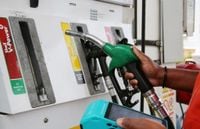eThekwini Municipality’s fuel consumption practices are under scrutiny after a recent Executive Committee meeting revealed alarming figures. Between January and March 2025, the municipality spent a staggering R86 million on fuel for its fleet of 9,240 vehicles, including 565 Durban Transport buses and various heavy construction equipment. This revelation has raised concerns about the management of fuel resources in the region.
The eThekwini city fleet monthly report for March 2025, presented to the Finance Committee, detailed the municipal fleet's operations. The report highlighted that the vehicles consumed approximately 4.3 million liters of fuel and traveled around 17.6 million kilometers during the three-month period. Key departments utilizing the most vehicles include the water and sanitation unit with 2,074 vehicles, the electricity department with 1,850, Parks with 860, and Cleansing and Solid Waste (CSW) with 858 vehicles.
To address the rising fuel costs, the municipality has implemented onboard vehicle monitoring systems that track vehicle locations and monitor driver behavior. This data is intended to help reduce operational costs by improving efficiency. Additionally, vehicles are prohibited from leaving the eThekwini area without prior permission, and line managers receive daily notifications of vehicle usage, with monthly reports escalated to departmental heads.
Concerns regarding fuel management were echoed by the eThekwini municipality Audit Risk Committee (ARC) in their report for the second quarter ending December 30, 2024. Chairperson Siboniso Shabalala expressed worries about the control environment surrounding fuel management, stating, "Internal audit also secured responses from the line departments so that there is implementation of the additional controls and monitoring required to arrest the challenges in this function." Shabalala noted that while there has been some action taken against excessive fuel usage, there remains a lack of proactive measures from line departments.
In response to the financial strain, eThekwini city manager Musa Mbhele announced that daily monitoring will be instituted to manage fuel costs more effectively. The municipality aims to ensure that any challenges related to fuel consumption are addressed immediately, aligning with the recently updated standard operating procedures (SOP) on fuel management.
Meanwhile, on May 8, 2025, fuel prices in India were reported to remain stable across major metropolitan cities, with petrol and diesel prices unchanged. In Delhi, petrol is priced at Rs 94.77 per liter, while diesel costs Rs 87.67. Mumbai sees petrol at Rs 103.50 per liter and diesel at Rs 90.03. Chennai experienced a slight reduction in petrol prices, now at Rs 100.90 per liter, and diesel at Rs 92.49. Kolkata's petrol stands at Rs 105.01, with diesel priced at Rs 91.82.
These prices have remained consistent since May 2022, following reductions in fuel taxes by the central and state governments. The last significant adjustment occurred in March 2025, when petrol prices were cut by Rs 2 per liter. Fuel pricing in India is reviewed daily by oil marketing companies, influenced by global crude oil prices and foreign exchange rates.
On the global stage, crude oil prices have recently plummeted, reaching their lowest levels since early 2021. Brent crude oil prices, which had surged after Russia's invasion of Ukraine, fell below the US$60 mark on May 5, 2025. This decline is attributed to an increase in production by the OPEC+ cartel, which has decided to ramp up output in May and June more than previously anticipated.
Analysts have noted that while wholesale petrol prices in Australia have dropped to as low as 156 cents per liter for regular unleaded, retail prices at the pump have not reflected these decreases as quickly. In major cities, petrol prices are expected to fall to around 160 cents per liter, but fluctuations in global oil markets could affect these predictions.
As the Australian economy grapples with the impacts of a shrinking GDP and slowing factory activity, the outlook for fuel prices remains uncertain. The Australian Competition and Consumer Commission (ACCC) has indicated that retail prices tend to follow a predictable cycle, which could delay the benefits of lower wholesale prices reaching consumers.
In summary, both local and global fuel management practices are facing challenges as municipalities and consumers navigate rising costs and fluctuating prices. The eThekwini Municipality's efforts to enhance fuel management through monitoring systems and daily oversight reflect a broader trend in addressing fuel efficiency and expenditure. Meanwhile, the stability of fuel prices in India and the volatility in global markets highlight the complexities of fuel economics.

